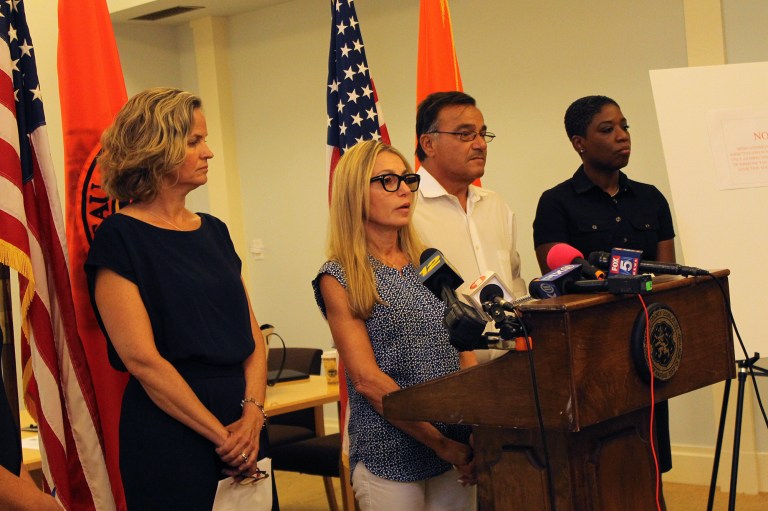
RoseMarie Sherry’s son injured his shoulder as a teenager and almost lost his life to the medications prescribed to help with the pain.
“It is very painful to watch, it’s very painful when you can’t do anything about it and it is your child,” Sherry said. “Like any other illness that creeps into your house and takes over your children, whether it’s addiction or diabetes or an eating disorder or cancer or anything else, it’s a disease. That needs to be discussed. It needs to be discussed every day with our children and we need to make different choices when it comes to what we allow to come into our homes.”
Nassau County Legislator Delia DeRiggi-Whitton (D-Glen Cove) introduced a bill Monday that would require all pharmacies in Nassau County to post a notice to customers on the addictive dangers of opioid pain killers.
The notice would read, “Medications containing opioids are addictive and subject to abuse. Use opioids only as directed by your physician.”
The sign will also be posted in Spanish, DeRiggi-Whitton said.
“This notice might seem like a small step, but it can have a big impact,” DeRiggi-Whitton said. “In just a few moments you stand waiting at the pharmacy counter to pick up a prescription for either yourself, your child or your family member, this notice might give you pause and remind you that these prescription drugs need to be taken with care and monitored closely so as not to lead to the tragedy of addiction.”
The bill is co-sponsored by county legislators Kevan Abrahams (D-Hempstead), Ellen Birnbaum (D-Great Neck), Arnold W. Drucker (D-Plainview), Siela Byone (D-Westbury) and Laura Curran (D-Baldwin).
DeRiggi-Whitton said 16 Nassau County residents have died from opiate abuse and overdose this month.
During the press conference Monday, volunteer EMT and Glen Cove activist Tony Jiminez shared his experiences with arriving on the scene of an overdose and seeing the affect on the victim’s family.
“Some of them were found by loved ones,” Jiminez said. “The broken hearts of the people — a mother finds a child or a husband finds his wife — seeing the anguish and pain in their face, it breaks your heart every time you have to go into that situation, and it doesn’t get any easier, and it’s not getting any less common.”
Long Island saw the most opioid-related deaths ever in 2016, Newsday reported, with more than 500 Nassau and Suffolk residents overdosing on both prescription opioids and the street version, heroin. Jiminez said there are two main strategies to combat this abuse: enforcement and education.
“We have to have our police enforcement. They have to enforce the laws we have to try to stop it and prevent it and reduce it,” Jiminez said. “The other component is education, and education is telling people what’s going on in their lives, opening their eyes to the fact that this isn’t just somebody else’s backyard. This is here, this is now, and this piece of legislation is a key component of this education process.”
Sherry said her son is in recovery in part because her family has shifted to an open discussion about the dangers of opioids.
“Keep a dialogue open. There’s nothing to be ashamed about,” Sherry said. “Anything could happen to any of our families, our children, but as long as we keep talking about it and not burying our heads in the sand, it’s not going away. It’s getting worse.”






